The Free Trade Agreement (FTA) between Ukraine and Israel was signed on 21.01.2019 and ratified on 11.07.2019 by the Law of Ukraine â„– 2753-VIII on Ratification of FTA between the Cabinet of Ministers of Ukraine and the Government of the State of Israel. The FTA entered into force on 01.01.2021.
What is worth paying attention to?
Firstly, on tariff liberalization that includes an immediate abolition (from the moment of the Agreement entry into force) of import duties on goods that are classified in groups 1 to 97 of the Harmonized System (HS) of origin from the Parties, unless otherwise provided for in their Tariff Schedules of Annex 2-C (Abolition of tariffs) to the Agreement, as well as the gradual phased reduction (during 3, 5, 7 years) in accordance with the same Tariff Schedules and Annex 2-C (Abolition of tariffs).
You can download Tariff Schedules for familiarisation on the website of the Verkhovna Rada (Parliament) of Ukraine at the following links:
- https://zakon.rada.gov.ua/laws/show/376_001b-19#n2 (tariff schedules of Israel);
- https://zakon.rada.gov.ua/laws/show/376_001a-19#Text (tariff schedules of Ukraine).
In particular, the following designations are used in the schedules:
- basic rate – the import duty rate from which the reduction begins;
- category – the term for designation of goods to which the procedure for reduction or abolition of duties specified in Annex 2-C (Abolition of Tariffs) is applied, unless otherwise provided for in the Tariff Schedules to this Annex.
Also, the Agreement provides for the establishment of a tariff quota (TRQ) for the import of goods, which means that particular goods will be supplied in certain quantities at a zero rate. In this case, the import of these goods over the defined amount will be subject to a duty rate established for such a product.
A generalised list of tariff quotas for imports into Israel, as indicated in the Israeli Tariff Schedule, where applicable, is set out in the Addendum to Annex 2-C (Abolition of Tariffs) to the Agreement.
It is important to note that Art. 12.6 of the Agreement involves the obligation (!!!) of the parties to review this Agreement within three years from the date of entry into force and every five years after that. In this case, as indicated in the specified Article, the Parties may by agreement change the deadlines, which provides for the possibility of accelerating the revision of tariff quotas established by the Agreement, the size of the duty and the reduction of transitional periods to full liberalisation for certain groups of goods, as well as the extension to other areas currently not covered by it.
Secondly, the Agreement provides for the application to Ukrainian-Israeli trading relations of the provisions of the Regional Convention on Pan-Euro-Mediterranean Preferential Rules of Origin, which significantly expands opportunities for Ukraine and Israel to interact within the framework of Pan-Euro-Honey and access their goods to new external markets.
Thus, Ukrainian manufacturers will be able to import raw materials from Israel, process them in Ukraine and export the final product duty-free, or at a reduced rate of duty to the EU (FTA Ukraine and EU). AT the same time the product will retain its preferential status and originate from Ukraine. The mirror situation for the Israeli manufacturer will work similarly.
To sum up, it should be noted that the conclusion of FTAs brings the relations between Ukraine and Israel to a new level, gives a chance to create favourable conditions for trade, economic and investment cooperation, development and strengthening of friendly relations between countries in areas of common interest, including related areas not covered by this Agreement.

This article was offered by De Jure Law Firm, based in Odessa, Ukraine





















